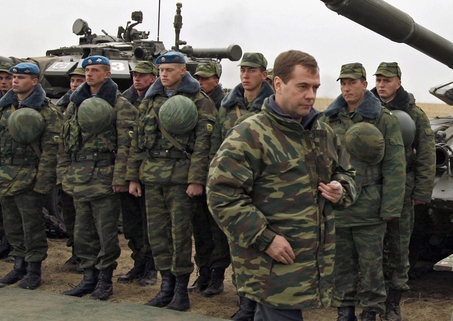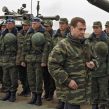
Russia’s Armed Forces: Adrift in a Storm
Publication: Eurasia Daily Monitor Volume: 8 Issue: 2
By:

Since the highly ambitious reform of Russia’s conventional armed forces was launched, December became a month for setting out future plans, achieving key targets or making various claims about its “success.” December 2009, for instance, marked the official completion of the transition to the brigade-based structure, while their “permanent readiness” status was supported by colorful claims that the brigades could respond “within one hour” to the order to deploy. December 2010, followed this pattern, confirming that the new joint-strategic commands (obyedinennyye strategicheskoye komandovanie –OSK’s) were formed to replace the six existing military districts (MD’s). However, amidst the apparently self-congratulatory atmosphere, among the country’s leadership and top brass there were uncomfortable signs of confusion over what the reform means, as well as the equally troubling issue of the defense minister’s level of competence.
President Dmitry Medvedev’s televised review of the year on December 24, 2010 provided an opportunity to establish the extent of presidential support for Defense Minister, Anatoliy Serdyukov, as well as the reform itself. Medvedev’s less than convincing response began by referring to the defense ministry as “hard working” though like other ministries it “makes mistakes,” then noting that it implemented presidential policy “on the whole.” Medvedev followed this by outlining some challenges facing the reform, a word he does not shy away from, including raising pay and improving conditions of service. According to the president, the “military reform” aims to “create an efficient army,” a markedly nebulous statement compared with his previous efforts to outline what the reform would involve. At no stage in Medvedev’s response did he name Serdyukov, let alone offer any unequivocal support (https://eng.kremlin.ru/news/1520, December 24).
Earlier, on December 14, the Chief of the General Staff Army-General Nikolai Makarov, held a live broadcast video conference with the commanders of the four OSK’s. Much of Makarov’s statement on the reform either referred to the past in order to justify such change, or to the future and the completion of the process; he offered surprisingly little detail on the present condition of the armed forces. In response to a question concerning the future of military manpower, Makarov suggested that the aim is to have an entirely contract personnel system, increasing their numbers gradually each year: a reversal of his position on the same issue which he detailed in late February 2010 (https://www.rian.ru/press_video/20101214/308454984.html, December 14).
Lieutenant-General Vladimir Chirkin, the Commander of Central MD/OSK, claimed that his force grouping’s combat capability had increased by 2.4 times. Lieutenant-General Aleksandr Galkin, the Commander of South MD/OSK justified the organizational changes which impacted on the former North Caucasus MD, in terms of meeting the challenges of terrorism and external threats (obliquely referring to Georgia). Galkin also claimed a substantial improvement in combat capability: 2.5 times. This was possible due to outsourcing duties such as cleaning and catering, allowing personnel to concentrate more fully on combat training. Thus, the number of training days each month has increased from 15 to 22, which has promoted the “belief” among commanders that conscripts serving for twelve months can be effectively trained. Neither Chirkin nor Galkin offered any explanation as to how combat capability had so vastly increased while the rate of renewing equipment and weapons in the armed forces stood at 2 percent annually (https://www.rian.ru/press_video/20101214/308454984.html, December 14).
On December 22, Serdyukov announced that combat readiness had increased throughout the armed forces by 50 percent, a rather arbitrary figure, and that by 2020 combat capability will similarly leap by 250 percent (Ekho Moskvy, December 22). The defence minister’s suggestion that readiness had improved so markedly based on organizational changes alone seems more an act of desperation than a serious observation about the success of the reform. Colonel-General Aleksandr Postnikov, the Commander-in-Chief of the Ground Forces, repeated precisely the same target for the coming combat training year as he set for 2010, namely enhancing the individual skills of servicemen. In Postnikov’s view, many of the goals related to raising combat readiness could be achieved as a result of changes to the training programs. In fact, Postnikov said the training day has been “increased” to eight hours and to ten hours during field exercises, while personnel engage in physical fitness training for five hours daily; no mention was made of non-combat training (Nezavisimoye Voyennoye Obozreniye, December 14). Russian soldiers, mostly serving as conscripts, therefore “train” for eight hours daily excluding an enforced afternoon nap (or quiet hour) and have weekends off, yet the top brass claim an exponential increase in readiness levels.
Serdyukov’s lengthy interview in Izvestiya on December 31, offered fresh insights into the confusion gripping the reform. Serdyukov denies the continued existence of dedovshchina, preferring the term “hooliganism,” while boasting that those opposing the reform have been “straightened out,” and blamed commanders for the existence of inter-ethnic conflicts in units as well as berating officers for failing to fulfill their own duties. Serdyukov’s assessment of the military reform is that it is “going pretty well” (Izvestiya, December 31).
In reality, the reform has assumed a life of its own, and faces a deep and protracted crisis linked to the evident increase in ill-discipline within units and burgeoning corruption levels which results in massive sums of money “disappearing” from the defense budget. Serdyukov was appointed in February 2007 to bring corruption under control (Profil, November 29). The apparent “answer” lies in separating the officer corps from large cash flows, overlooking the potential for civilians to engage in equally corrupt activities. Moreover, given the high levels of corruption within Russia, it is difficult to foresee how the defense ministry might become a beacon of integrity.
Interpretations of the content, aims and future course of the reform have become widely varied and appear to require a large degree of “belief.” Serdyukov and the top brass have vacillated over key issues: abandoning adopting an all-volunteer manning system, then saying it is back on the agenda, planning to introduce military police, postponing the initiative, then reintroducing the plan as a bolt hole for 20,000 discharged officers. Such an absence of clear direction from Serdyukov combined with his lack of respect towards and inability to earn it from men in uniform has reduced confidence in the reform, and rendered his own future more precarious.




